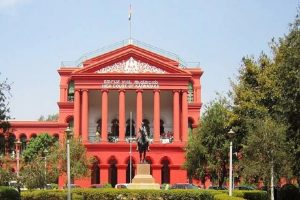 The Karnataka High Court in the case of M/S. ALSTOM TRANSPORT INDIA LIMITED VERSUS COMMISSIONER OF COMMERCIAL TAXES, ADDITIONAL COMMISSIONER OF COMMERCIAL TAXES (ENFORCEMENT), SOUTH ZONE, DEPUTY COMMISSIONER OF COMMERCIAL TAXES (ENFORCEMENT) -08, SOUTH ZONE, ASSISTANT COMISSIONER OF COMMERCIAL TAXES ENFORCEMENT-20, SOUTH ZONE vide WRIT PETITION NO. 1779 OF 2025 (T-RES) dated 15.07.2025, held that the secondment of expats does not constitute import of manpower supply service. The services rendered by employees to their employer are not liable to GST under Entry 1 of Schedule III of the CGST Act. The reimbursements are not consideration, and in the absence of invoice and with full ITC, no tax is payable under the CBIC Circular.
The Karnataka High Court in the case of M/S. ALSTOM TRANSPORT INDIA LIMITED VERSUS COMMISSIONER OF COMMERCIAL TAXES, ADDITIONAL COMMISSIONER OF COMMERCIAL TAXES (ENFORCEMENT), SOUTH ZONE, DEPUTY COMMISSIONER OF COMMERCIAL TAXES (ENFORCEMENT) -08, SOUTH ZONE, ASSISTANT COMISSIONER OF COMMERCIAL TAXES ENFORCEMENT-20, SOUTH ZONE vide WRIT PETITION NO. 1779 OF 2025 (T-RES) dated 15.07.2025, held that the secondment of expats does not constitute import of manpower supply service. The services rendered by employees to their employer are not liable to GST under Entry 1 of Schedule III of the CGST Act. The reimbursements are not consideration, and in the absence of invoice and with full ITC, no tax is payable under the CBIC Circular.
Facts of the Case: In this case, the petitioner is engaged in infrastructure projects for railways and metros, including design, manufacturing, installation, and software-related services. Between July 2017 and March 2023, employees from overseas group entities were seconded to work in India under formal employment agreements with the petitioner. These expats worked exclusively for the Indian entity and were assigned full-time roles in India.
The petitioner entered into individual employment agreements with the expats. Salaries were paid by the petitioner directly, with TDS deducted as per Indian Income Tax laws. The foreign entity continued to pay social security and retirement benefits in the home country, and these were reimbursed by the petitioner without any markup or service charge.
The Petitioner, from November 2020 has voluntarily discharged IGST under the Reverse Charge Mechanism on the amounts reimbursed to the foreign entities, and claimed ITC on the same. No invoice was issued by the foreign entity for any manpower services.
However, the department issued a show cause notice demanding IGST for the entire period, alleging the arrangement to be import of “manpower supply services”.
The petitioner relies on CBIC Circular No. 210/4/2024-GST dated 26.06.2024, which clarifies that where no invoice is issued in related party services and full ITC is available, the value may be deemed ‘Nil’.
Issue: Whether the secondment of expat employees constitutes a taxable “supply of manpower services” under GST law. Whether the relationship between the petitioner and the expats is that of employer-employee, and thus excluded from GST under Entry 1 of Schedule III of the CGST Act. Whether in the absence of any invoices and in light of Circular 210/4/2024-GST, the taxable value can be deemed as ‘Nil’ under Rule 28(1) of the CGST Rules.
Held that:
The High Court noted that expatriate employees were on the payroll of the petitioner and functioned under its direct control and supervision. Individual employment agreements were executed between the petitioner and the expats, who were assigned official email IDs, responsibilities, and benefits, similar to regular employees.
The TDS on salaries was deducted and paid to the Indian Income Tax Department by the petitioner. The fact that social security contributions were reimbursed to the foreign entity does not override the actual functional employment by the petitioner.
The Court held that there exists a clear employer-employee relationship, and services rendered during such secondment fall under Schedule III, which excludes such activities from the scope of supply under GST.
Further, the Court heavily relied on Paragraph 3.7 of the CBIC Circular 210/4/2024-GST dated 26.06.2024, which clearly states that in case of related party transactions, where no invoice is raised and full ITC is available, the value of supply may be deemed as ‘Nil’ under Rule 28 of the CGST Rules. In this case, the petitioner did not raise any invoice, and full ITC was available and claimed. The Court held that the department’s insistence on taxing the reimbursement ignores the binding CBIC Circular, which specifically deals with valuation in such related-party transactions.
The Court discussed the Supreme Court’s ruling in Northern Operating Systems (NOS) case, but clarified that NOS case was based on different facts, particularly where the foreign entity retained control and raised invoices for services. Here, the petitioner did not receive any invoice, the expats were fully integrated into the Indian entity, and there was no profit element or markup in reimbursements.
The Court therefore quashed the impugned orders confirming IGST demand. Writ Petition is allowed. No tax liability exists for the petitioner under GST for the secondment of expat employees.
To read the complete judgment 2025 Taxo.online 1628


